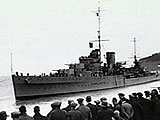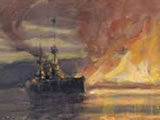What happened that day?
See historic events for any day of the year by entering the date below. Why not try your birthday?
Kiwi of the Week
Today in History

1941 HMS Neptune lost in Mediterranean minefield
It was New Zealand's worst naval tragedy. When the Royal Navy cruiser HMS Neptune struck enemy mines and sank off Libya on the morning of 19 December 1941, more than 750 men lost their lives. Among them were 150 New Zealanders.
In early 1941 the New Zealand government had answered the Admiralty's call for more sailors to man the increasing number of warships being brought into service. The intention was for New Zealand to provide a crew for an additional Leander-class light cruiser to serve alongside its existing ships Achilles and Leander; HMS Neptune had been approved for this purpose.
Neptune had been expected to leave Britain for New Zealand in May 1941, but because of the heavy loss of cruisers during the Crete campaign, it was instead attached to the 7th Cruiser Squadron in the Mediterranean. Neptune joined Admiral Cunningham's Malta-based Force K. On 17 December every available ship was deployed to protect the oiler HMS Breconshire on its passage to Malta. At the same time, the Italians were sending an important supply convoy to Tripoli, Libya.
Force K sailed on the 18th to intercept this convoy. There was a strong south-westerly wind and a heavy sea. At 1 a.m. the next morning the ships were 20 miles from Tripoli when they stumbled into an uncharted deep-water minefield. Neptune triggered a mine with one of its protective paravanes, while astern the cruiser HMS Aurora also detonated a mine. Reversing to get clear, Neptune exploded two more mines, damaging its propellers and steering gear. Over the following three hours other ships made several attempts to assist. But when the destroyer Kandahar also hit a mine, Neptune's Captain O'Conor flashed a warning to other ships to 'Keep away'.
At 4 a.m. Neptune struck another mine and sank within minutes. Only 16 men managed to reach a raft. Over the next five days they died one after another. AB Norman Walton was the sole survivor; he was rescued by the Italians on Christmas Eve and became a prisoner of war.
Image: HMS Neptune (Wikipedia)

1915 The evacuation of Suvla Bay
In a well-planned operation which contrasted sharply with those mounted earlier in the Gallipoli campaign, the troops were successfully withdrawn on 19 and 20 December.
In the eight months since the first landing at Gallipoli on 25 April, 2721 New Zealanders had been killed and nearly 5000 wounded fighting in the Allies' failed attempt to take the peninsula from the Turks.
Image: The evacuation from Salonica, Gallipoli














